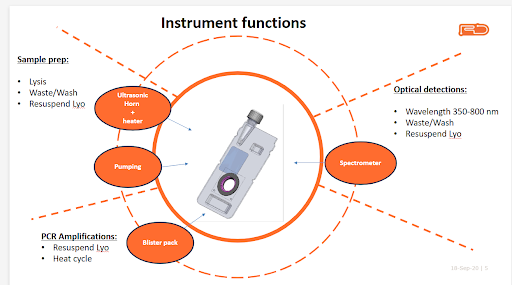RD Support Enlightens The Medical Field On Micro Pumps As The Next Point Of Care Testing Device

When the COVID-19 pandemic hit, much of the world was caught off guard, not just by the virus but by the sheer lack of medical preparedness. In 2020, many healthcare workers in the EU reported a critical shortage of personal protective equipment (PPE). It was a time marked by fear, uncertainty, and urgency, and it revealed deep cracks in the global health infrastructure.
Co-founder and director of RD Support, John Arvidsen, believes individuals can't afford to be caught unprepared again.
"Frontline workers were risking their lives every day with limited protection and unreliable tools," says Arvidsen. "We were unprepared, and that should never happen again. There will be a next time, and this time, we have the technology to do better."
One such innovation is the Micro Pump, a precision-engineered, disposable device designed to integrate seamlessly with lab-on-a-chip (LOC) systems. Developed in 2012 and patented in 2019, the Micro Pump offers a breakthrough in minimizing contamination during diagnostic testing. As Arvidsen puts it, "It's a simple, elegant solution that reduces human handling and keeps everything contained. And that's critical when time, safety, and accuracy matter most."
Micro Pump's innovation is in its ability to handle fluids, including blood, saliva, or chemical reagents, within a fully enclosed, self-contained system. It eliminates the need for syringes, tubes, and the manual transfers that too often become points of failure. "You just put your sample in, close the patch, and everything is pumped and analyzed within the cartridge," Arvidsen explains. "No tubes, no extra steps, no risk of cross-contamination. And for a nurse in a high-stress frontline environment, that's a game changer."

These pumps are particularly well-suited to LOC systems, micro-scale diagnostic tools that shrink entire laboratory processes onto a chip the size of a credit card. These chips use etched microchannels and sensors to mix, move, and analyze fluids with minimal sample and reagent volumes. Although such types of pumps are already in use for at-home tests for COVID-19, the demand is growing rapidly for more complex medical diagnostics delivered at the point of care.
One UK-based diagnostic company, QuantuMDx, partnered with RD Support from concept, through design, and optimization for its SARS-CoV-2 and Flu A/B testing cassettes, scaling production rapidly from concept to pilot manufacturing.
Unlike some traditional pumps, RD Support's Micro Pump uses low surface energy polypropylene (plastic), making it ideal for molecular and diagnostic applications. It's engineered for consistent and reliable flow, with configurations ranging from microliters per minute to milliliters per minute. It can be customized or standardized depending on the client's cartridge design.
More importantly, it's designed for mass manufacturing. "We know the challenges of taking a medical device from concept to market, taking 8 to 10 years," Arvidsen says. "Our clean room, in-house molding tools, and assembly capabilities allow us to cut that time drastically. We don't just prototype—we build for scale."
That end-to-end control means RD Support isn't just a supplier. It's a strategic partner to both established medical device companies and startups alike. "We've been in your shoes," says Arvidsen. "We know what it's like to be on a deadline with an idea that has real potential but no clear path to manufacturing. We help clear that path."
Lab-on-a-chip systems and microfluidics are reshaping modern medicine, from personalized drug screening and organ-on-chip modeling to rapid diagnostics in rural or crisis-struck areas. The Micro Pump enhances all of these use cases by ensuring closed-loop, contamination-free handling at a low cost and high volume.
Beyond disease diagnostics, the applications are endless: from delivering medicines in controlled doses to PCR testing to moving special oils or biochemical samples in tightly regulated conditions.
And with the next global health crisis not a matter of if, but when, Arvidsen believes it's time to invest in scalable, smart solutions now, before lives are at risk again.
© Copyright IBTimes 2025. All rights reserved.





















